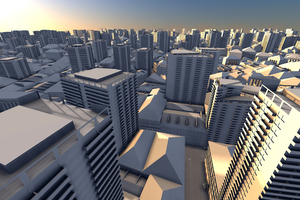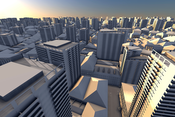Information
- Publication Type: Journal Paper with Conference Talk
- Workgroup(s)/Project(s):
- Date: May 2015
- Journal: Computer Graphics Forum
- Volume: 34
- Number: 2
- Location: Zurich, Switzerland
- Lecturer: Oliver Mattausch
- ISSN: 1467-8659
- Event: Eurographics
- Conference date: 4. May 2015 – 8. May 2015
- Pages: 537 – 548
- Keywords: occlusion culling, ray tracing
Abstract
We propose a new technique for in-core and out-of-core GPU ray tracing using a generalization of hierarchical occlusion culling in the style of the CHC++ method. Our method exploits the rasterization pipeline and hardware occlusion queries in order to create coherent batches of work for localized shader-based ray tracing kernels. By combining hierarchies in both ray space and object space, the method is able to share intermediate traversal results among multiple rays. We exploit temporal coherence among similar ray sets between frames and also within the given frame. A suitable management of the current visibility state makes it possible to benefit from occlusion culling for less coherent ray types like diffuse reflections. Since large scenes are still a challenge for modern GPU ray tracers, our method is most useful for scenes with medium to high complexity, especially since our method inherently supports ray tracing highly complex scenes that do not fit in GPU memory. For in-core scenes our method is comparable to CUDA ray tracing and performs up to 5.94 × better than pure shader-based ray tracing.Additional Files and Images
Weblinks
BibTeX
@article{MATTAUSCH-2015-CHCRT,
title = "CHC+RT: Coherent Hierarchical Culling for Ray Tracing",
author = "Oliver Mattausch and Jir\'{i} Bittner and Alberto Jaspe and
Enrico Gobbetti and Michael Wimmer and Renato Pajarola",
year = "2015",
abstract = "We propose a new technique for in-core and out-of-core GPU
ray tracing using a generalization of hierarchical occlusion
culling in the style of the CHC++ method. Our method
exploits the rasterization pipeline and hardware occlusion
queries in order to create coherent batches of work for
localized shader-based ray tracing kernels. By combining
hierarchies in both ray space and object space, the method
is able to share intermediate traversal results among
multiple rays. We exploit temporal coherence among similar
ray sets between frames and also within the given frame. A
suitable management of the current visibility state makes it
possible to benefit from occlusion culling for less coherent
ray types like diffuse reflections. Since large scenes are
still a challenge for modern GPU ray tracers, our method is
most useful for scenes with medium to high complexity,
especially since our method inherently supports ray tracing
highly complex scenes that do not fit in GPU memory. For
in-core scenes our method is comparable to CUDA ray tracing
and performs up to 5.94 × better than pure shader-based ray
tracing.",
month = may,
journal = "Computer Graphics Forum",
volume = "34",
number = "2",
issn = "1467-8659",
pages = "537--548",
keywords = "occlusion culling, ray tracing",
URL = "https://www.cg.tuwien.ac.at/research/publications/2015/MATTAUSCH-2015-CHCRT/",
}


 draft
draft
